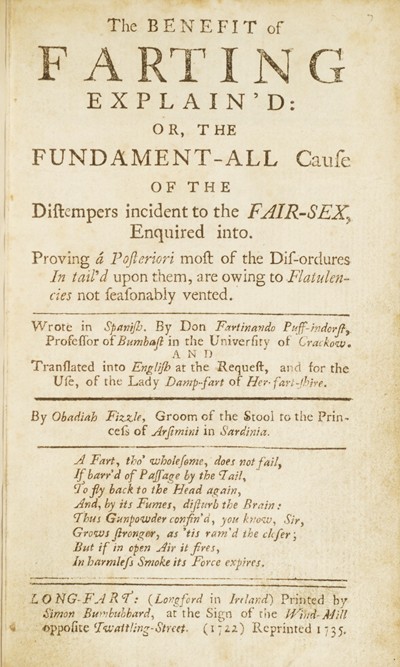The Essay About Farting -- That Argued for Women's Rights

From inventing meaningless national holidays to pardoning long-dead suffragists, men really will do anything to avoid actually letting women have rights, and it's a sad fact that apparently hasn't changed in 300 years. That's when satirist Jonathan Swift (you know, the guy who dared to ask why starving peasants don't simply eat their children) noticed it, too, and placed his tongue firmly in an altogether different cheek to explain why the women's mental health crisis of the 18th century could be solved by unrestricted ass-blasting.

In "The Benefits of Farting Explained," Swift first acknowledges the "numberless train of distempers" that has "fallen chiefly on the fairer sex," including "hysteria," the "vapors," and all those other old-timey euphemisms for going nuts because society considers you a sexy infant. Unlike his contemporaries, however, he attributes the phenomenon to all the coffee and tea drunk by women at the gatherings that were their only opportunity to "divert the hours" and "circulate intelligence" since they were "debarred the benefit" of all other avenues for participating in society, as "there is commonly as much wind as water being sucked in, which ... recoils up into the bowels, stomach, and head, and there occasions all those dreadful symptoms ... all which one seasonable fart might have prevented."
After a brief aside to explore the "nature and essence of a fart," which "prove the vast subtlety of matter, since a fart, which in the hydrostatical balance does not weigh the thousandth part of a grain, shall in one minute expand itself so far as to occupy the whole atmosphere of a large drawing room," Swift dives into his fartpothesis. Specifically, suppressing all that gas causes "frequent fits of laughing and crying without any sensible cause" because "the windy vapor getting into the muscles that assist in laughing inflates them and occasions their laughing; but if this vapor, when raised to the head, is there condensed by a cold melancholy constitution, it distills through the eyes in the form of tears." The secret's out: Lady laughter and tears are just held-in farts. "But in women of a more strong constitution," he continues, "it vents itself entirely in talkativeness, hence we have a reason why women are more talkative than men."
Don't Miss
Having clearly proven his case, Swift suggests that "the same authority which introduced hooped petticoats can also bring farting in fashion." To get the whole thing started, he recounts his (fictional, to be clear) memory of reading that people of different sizes fart at different pitches and muses that women could "form a farting consort, by ranging persons of different sizes in order, as you would a ring of bells or a set of organ pipes -- which entertainment would prove much more diverting round a tea table than the usual one of scandal."
Exactly what Swift was arguing is a matter of some debate. It seems clear that he was satirizing the lengths to which men go to avoid actually addressing the problem of gender equality, but he may have also been truly dismayed on some level by the relatively recent taboo of farting. It seems equally likely, considering the names he gives to the people he discusses ("the late widow Fartwell," "Dorothy Dampfart," "Blowza Van Funk"), that he just really wanted to make a bunch of fart jokes.
Top image: Jonathan Swift, Charles Jervas